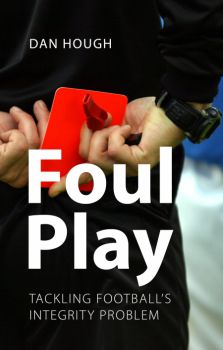Foul play: corruption expert focuses on football's growing integrity crisis in new book
By: Tom Walters
Last updated: Thursday, 17 October 2024

- New book explores how integrity has been compromised both on and off the football pitch
- Leading clubs and officials are playing a central role in perpetuating ethical failures, according to corruption expert
- Calls for tightening regulations and prioritising ethical leadership to address issues
As the football season picks up pace, a new book published today (17 October) raises questions over the integrity of the sport.
Foul Play: Football’s Integrity Problem, written by Professor Dan Hough, Co-Director of the Sussex Centre for the Study of Corruption at the University of Sussex, highlights how issues as wide-reaching as player dissent and petulance to clubs breaching spending limits or operating in administrative grey areas, are undermining the essence of fair competition in the sport.
The book, released through Agenda Publishing, highlights how corruption at the highest levels of football's governing bodies, most notably FIFA, has called into question its commitment to transparency. The awarding of World Cup hosting rights to Russia and Qatar, he argues, are emblematic of deep-rooted governance issues that seem to be tearing the game apart.
Prof Dan Hough, Professor of Politics at the University of Sussex, said:
“Football is in a dark place. Yet many people seem to be blissfully unaware of it. In this book I argue that whilst football continues to be the world's most popular game, it faces a whole series of significant challenges. All of those challenges centre around a (lack of) integrity.
“Players need to show more integrity on the pitch, fans need to show more respect for the game off it and those who govern the game need to remember that there's more to football than the big stakeholders making ever greater profits. There’s a long way to go and a lot of work to be done. No silver bullets exist, but small, specific steps can and will make a difference.”
Prof Hough also raises the issue of high-profile governance failures with bodies such as UEFA and FIFA failing to implement meaningful reforms. He argues that their narrow focus on match-fixing overlooks the broader integrity issues plaguing the sport, such as unethical player behaviour and questionable financial dealings amongst club owners.
The book also looks elsewhere within the football ecosystem by exploring the behaviour of the players themselves on the field as a yardstick to gauge just how endemic the question of integrity has become throughout football structure, from governance to grassroots.
He questions how on the field players regularly engage in "shithousery"—a term used to describe player behaviour that pushes the boundaries of fair play. Or, how players practising the ‘dark arts’—a term used to refer to the use of subtle, often unsportsmanlike behaviour is now viewed by some as an acceptable practice, further eroding integrity in the sport.
Football fans need not be too disheartened though. Prof Hough suggests that football can restore its integrity by prioritising ethical leadership and tightening regulations that address unsporting behaviour, financial mismanagement, and governance transparency.
He calls for stricter enforcement of existing rules and the creation of independent oversight bodies to ensure fair play at all levels of the game. For example, Professor Hough suggests that an independent regulator looking at club spending in real time would also prevent the long, drawn-out discussions on whether club have broken the current rules. Put simply, if clubs go over their limits, then sanctions would be immediately introduced. In the long term this would, he suggests, force clubs to be more resilient financial organisations.
Foul Play: Football’s Integrity Problem is released today on via Agenda Publishing.




